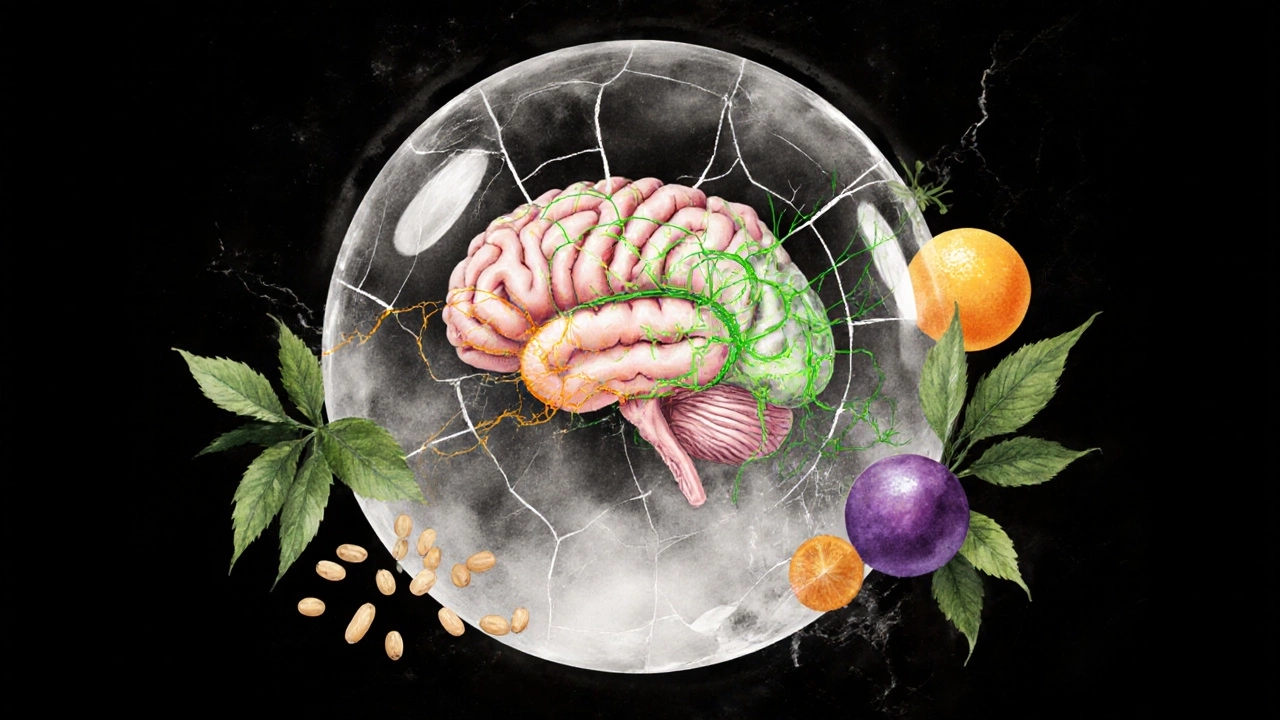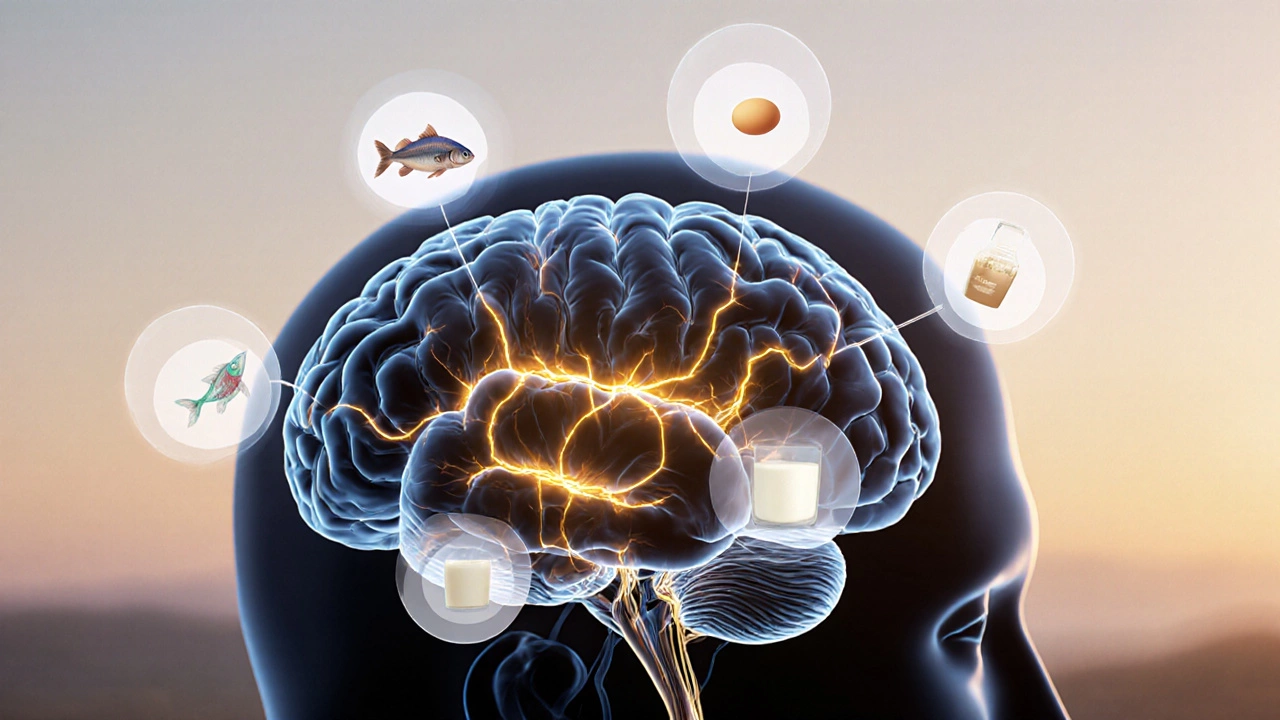Brain Fog Vitamin Checker
How do you rate your brain fog symptoms?
Select the symptoms you're experiencing. The more accurate your selection, the better our recommendation.
Brain fog isn’t just feeling tired. It’s that thick, sluggish feeling where you can’t focus, forget simple words, or struggle to make even small decisions. You’re not lazy-you’re just stuck in a mental haze. And while stress and poor sleep play a role, one of the most common hidden causes is a simple nutrient deficiency. The right vitamins can clear that fog faster than caffeine ever could.
Why brain fog happens (and why vitamins matter)
Brain fog isn’t a diagnosis. It’s a symptom. And it often shows up when your brain isn’t getting the fuel it needs. Your brain uses 20% of your body’s energy, even though it’s only 2% of your weight. That means even small gaps in nutrition can throw off your focus, memory, and mood.
When you’re low on certain vitamins, your brain cells don’t produce energy efficiently. Neurotransmitters like serotonin and dopamine get disrupted. Blood flow slows. Inflammation creeps in. All of this adds up to that heavy, fuzzy feeling you can’t shake.
Unlike pills that promise quick fixes, vitamins work from the inside out. They don’t mask symptoms-they fix the root problem. And the best part? Many of these deficiencies are easy to fix with diet or a simple supplement.
The top vitamins that fight brain fog
Not all vitamins help equally. Some have strong, science-backed links to mental clarity. Here are the top three that make the biggest difference.
Vitamin B12: The brain’s energy switch
Vitamin B12 is critical for nerve function and the production of myelin-the protective coating around your brain’s wiring. Without enough B12, signals between neurons slow down. That’s why low B12 is linked to memory loss, confusion, and brain fog.
Studies show that people with low B12 levels perform worse on cognitive tests, even if they don’t have full-blown anemia. In one 2023 study of adults over 50, those with B12 levels below 300 pg/mL had significantly higher rates of mental fogginess than those with levels above 400 pg/mL.
Who’s at risk? Vegans, older adults, and people on acid-reducing medications like omeprazole. B12 isn’t found in plants, and your body absorbs less of it as you age. If you’re constantly tired, forgetful, or have tingling in your hands and feet, get your B12 checked.
Vitamin D: The mood and memory vitamin
Vitamin D isn’t just for bones. It’s a hormone that affects nearly every tissue in your body-including your brain. Receptors for vitamin D are scattered across the hippocampus and prefrontal cortex, areas tied to memory and decision-making.
Low vitamin D is one of the most common deficiencies worldwide. In South Africa, even with plenty of sun, people who work indoors, wear sunscreen daily, or have darker skin are often deficient. A 2024 review found that people with vitamin D levels below 20 ng/mL were twice as likely to report brain fog compared to those above 30 ng/mL.
Fixing it isn’t complicated. A daily 1,000-2,000 IU supplement, plus 15 minutes of midday sun on your arms and face, can lift levels in weeks. Many people report clearer thinking and better mood within a month.
Vitamin B9 (Folate): The brain’s repair kit
Folate, or vitamin B9, helps your body make DNA and repair cells-including brain cells. It also helps lower homocysteine, a compound that builds up when folate is low and is linked to brain inflammation and cognitive decline.
Low folate is common in people who eat processed foods, drink alcohol regularly, or have MTHFR gene variants (which affect how your body processes folate). Symptoms include poor concentration, irritability, and that dull, slow-thinking feeling.
Leafy greens, lentils, and fortified grains are good sources. But if you’re struggling with brain fog and your diet isn’t perfect, a methylfolate supplement (the active form) can make a noticeable difference in 3-6 weeks.
Other nutrients that support mental clarity
While B12, D, and folate are the big three, other nutrients play supporting roles.
- Omega-3s (DHA): Found in fatty fish, they help keep brain cell membranes flexible. Low levels are tied to slower thinking and poor memory.
- Magnesium: Helps regulate stress hormones and supports neurotransmitter function. Magnesium glycinate is the best form for brain fog.
- Vitamin C: Acts as an antioxidant in the brain. Low levels are linked to mental fatigue and slower processing speed.
- Iron: Especially important for women of childbearing age. Iron deficiency reduces oxygen flow to the brain, leading to mental sluggishness.
These don’t cause brain fog on their own-but if you’re already low on B vitamins or vitamin D, being low on these too makes things worse.

What to do next: A simple 3-step plan
Don’t guess. Don’t take 10 supplements at once. Follow this practical plan.
- Get tested. Ask your doctor for a blood test: B12, folate, vitamin D, ferritin (iron stores), and homocysteine. Don’t rely on “normal” lab ranges-optimal levels for brain function are often higher than the minimum.
- Start with the basics. If your levels are low, take: 1,000 mcg of methylcobalamin (B12), 1,000 IU of vitamin D3, and 400 mcg of methylfolate daily. Give it 4-6 weeks.
- Eat real food. Add eggs, fatty fish, spinach, lentils, nuts, and citrus fruits to your meals. Food gives you co-factors that supplements alone can’t match.
Many people notice a shift in clarity within 2-3 weeks. It’s not magic-it’s your brain finally getting the nutrients it’s been begging for.
What doesn’t work
Don’t waste time on:
- Brain-boosting smoothies with spinach and spirulina if you’re low on B12-those won’t fix the core issue.
- “Nootropic” stacks with expensive, unproven compounds like lion’s mane or modafinil. They might give a temporary buzz, but they don’t fix nutrient gaps.
- Just drinking more coffee. Caffeine masks fatigue but doesn’t heal the underlying problem.
Fix the foundation first. Everything else builds on that.

When to see a doctor
Brain fog can also be caused by thyroid issues, chronic stress, sleep apnea, or long COVID. If you’ve tried the vitamin approach for 8 weeks with no change, or if you have other symptoms like weight changes, heart palpitations, or persistent fatigue, see a doctor.
But if your brain fog started after switching to a plant-based diet, during menopause, or after years of eating takeout meals? Chances are, it’s a vitamin gap-and it’s fixable.
Can vitamin B12 really clear brain fog?
Yes, especially if you’re deficient. B12 is essential for nerve function and energy production in brain cells. People with low B12 levels often report sharper focus, better memory, and less mental fatigue within weeks of supplementing. It’s not a quick fix for everyone-but if your levels are low, it’s one of the most effective fixes.
Is vitamin D good for brain fog?
Absolutely. Vitamin D receptors are active in areas of the brain that control mood and memory. Low levels are strongly linked to brain fog, especially in people with limited sun exposure. Taking 1,000-2,000 IU daily can improve mental clarity in as little as 3-4 weeks for those who are deficient.
How long does it take for vitamins to help brain fog?
Most people notice a difference in 2-4 weeks. B12 and vitamin D tend to show results fastest-sometimes in under a week for severe deficiencies. Folate and magnesium may take 4-6 weeks. The key is consistency. Don’t stop after a few days. Your brain needs time to rebuild.
Can I get enough of these vitamins from food alone?
It’s possible-but hard for most people. B12 is only in animal products, so vegans and vegetarians almost always need a supplement. Vitamin D is hard to get from food unless you eat fatty fish daily. Folate is in greens and legumes, but cooking destroys a lot of it. For most people with brain fog, a combination of food and targeted supplements works best.
Do I need to take all these vitamins at once?
No. Start with B12, vitamin D, and folate-they’re the most likely culprits. Test your levels first if you can. If you’re not deficient in iron or magnesium, you don’t need them yet. Overloading on supplements can cause side effects. Less is often more.
Final thought: Your brain deserves better than guesswork
Brain fog feels like a personal failure. But it’s rarely about willpower. It’s often just your body asking for help. You don’t need expensive gadgets, apps, or extreme diets. Sometimes, all you need is a B12 pill, a vitamin D drop, and a plate of spinach. Your brain isn’t broken-it’s just hungry. Feed it right, and the fog will lift.
